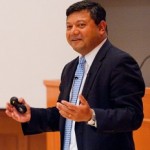GHG
SEMO Celebrates Earth Day with No Impact Week
Apr. 22, 2014—Vanderbilt’s Sustainability and Environmental Management Office (SEMO) celebrated Earth Day a little early by organizing a “No Impact Week” April 14-18 on campus. SEMO staffers converged on the Rand Wall to encourage the Vanderbilt community to improve their conservation efforts—including eating locally, conserving water and using only items that can be recycled—and then talk about...
In Class and Across Campus, Vanderbilt Helps Future Generations Find Relief for an Overstressed Planet
Mar. 18, 2014—[Originally published in Vanderbilt Magazine] Written by Joanne Lamphere Beckham From corporate boardrooms to statehouse chambers to the halls of academe, sustainability is one of this century’s biggest challenges. Although defined in many ways, sustainability is generally understood as “development that meets the needs of the present without compromising the ability of future generations to meet...
Vanderbilt greenhouse gas emissions down 19% since 2008
Oct. 23, 2013—[Read MyVU story here and full 2012 Greenhouse Gas Emissions Inventory here] Since 2005, Vanderbilt’s Greenhouse Gas emissions have decreased by: Vanderbilt’s Sustainability and Environmental Management Office has released an updated inventory of the campus’s greenhouse gas (GHG) emissions for the calendar years 2005-2012 to mark Campus Sustainability Day, Oct. 23. This inventory illustrates Vanderbilt’s current...
VU Power Plant to Convert to All-Natural Gas
Apr. 22, 2013—As of November 19, 2014, Vanderbilt is coal free! Vanderbilt University currently has an on-campus co-generation, natural gas-fueled power plant which produces 23% of our electricity and 100% of our steam, servicing 12 million square feet of building space. This steam is then used for 90% of campus heating, sterilization, and 40% of campus cooling....
Greenhouse gas emissions down 12 percent since 2008
Oct. 25, 2012—Vanderbilt releases updated report to mark Campus Sustainability Day Overall greenhouse gas emissions from Vanderbilt’s campus and medical center have decreased by 12 percent from an all-time high reached in 2008—and by 7 percent from 2005 to 2011—even though the institution has seen significant growth in square footage, staff, students and research dollars over the...
2011 Greenhouse Gas Emissions Inventory Update, Published October 2012
Oct. 22, 2012—In recognition of Campus Sustainability Day, observed on October 24, 2012, Vanderbilt released an updated inventory of greenhouse gas (GHG) emissions inclusive for calendar years 2005 through 2011. The GHG emissions inventory illustrates Vanderbilt’s current carbon footprint and provides trending information over the past seven years. Overall GHG emissions from the campus and medical center decreased by...
Vanderbilt Green Fund application deadline extended!!
Oct. 18, 2012—The Vanderbilt Green Fund was established in the spring of 2011 as a way of connecting student sustainability ideas with the means to implement them. We are looking for ideas that are both visible and educational in nature. Past projects awarded have involved solar panels, light sensors, and shower timers. Applications for projects will be...
‘Low-Carbon Living’ talk on May 17
May. 1, 2012—The Union of Concerned Scientists (UCS) has just published a book, Cooler, Smarter: Practical Steps for Low-Carbon Living. David Friedman, who is an engineer and deputy director for the UCS’s Clean Vehicles Program, will talk about the book at 12 noon, May 17, in room 123 Buttrick. This event is co-sponsored by the Vanderbilt Climate...
Law professor sees progress where environmental and economic good meets
Nov. 18, 2011—by Amy Wolf [Article originally published in Vanderbilt View] Environmental law and property law expert J.B. Ruhl said he considers himself part of the “radical middle” when it comes to helping craft solutions to controversial environmental issues. “Sometimes you need to take an environmental good and pair it up with an economic good to get...
Seeking game-changing energy technologies
Nov. 11, 2011—by David Salisbury “Gentlemen, we have run out of money. It’s time to start thinking.” This quote, attributed to the New Zealand physicist Ernest Rutherford, summarizes the main point of the presentation that the director of the newest federal research agency, the Department of Advanced Research Projects Agency–Energy (DARPA-e), gave on campus this week. The...




